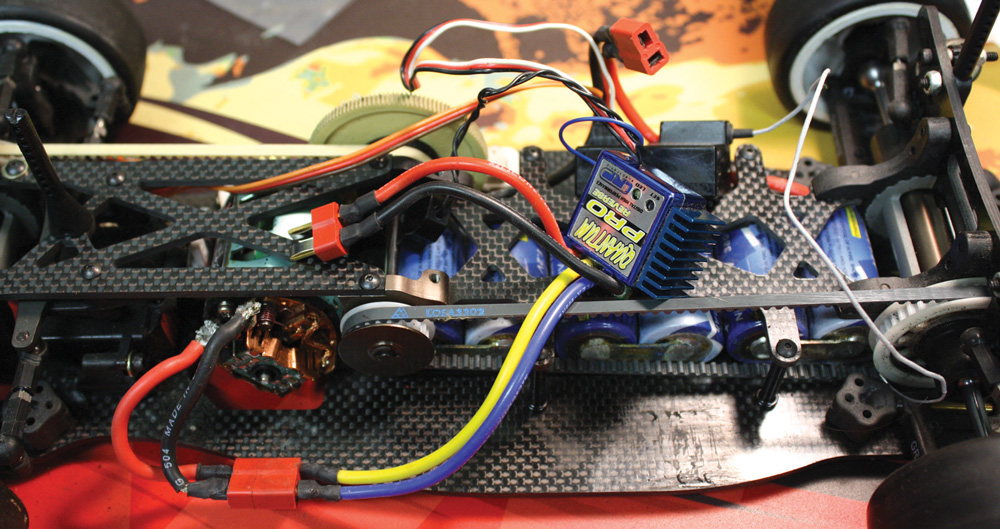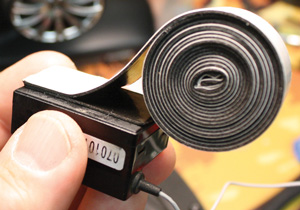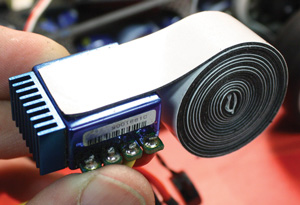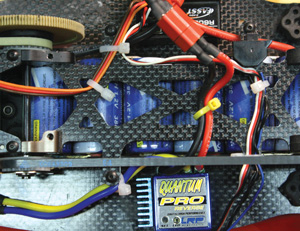
By Charlie Suangka

This month, let’s take a look at some installation basics that many of us may have forgotten about.
My big warning is about the tape you use. Do not use the gray weatherstripping tape from the home improvement store. It comes in a roll, has red backing and really damages RC electronics. Do not use it. The same goes for Velcro. Remember, this is not an art project, it’s an RC car! Mounting tape should be spongy and provide shock protection. It should not be “permanent” tape. If you crash into something hard enough that your gear comes free inside, you don’t solve the problem with stronger tape. You solve the problem by not slamming the car into things. The “release” of the tape is often saving your electronics from further shock damage!
First and foremost is the receiver. The receiver is the lifeline back to you. If your receiver is not mounted correctly, it will be damaged. There are no moving parts, only resistors and capacitors, but there are also very delicate oscillator crystals and filters that allow the receiver to do its job. These delicate components need protection from vibration and shock damage. The easiest way to provide this protection is with nice soft double-sided mounting tape. It’s okay to use two layers to provide extra cushioning and it’s easy to do.

Next up is your ESC (electronic speed control.) This bad boy does the rest of the work in your car. It distributes the power to the various parts of your vehicle. Make sure this guy is mounted well. Clean the case, clean the chassis. If your speed control comes loose in your car, the tabs and wiring can easily become damaged and “boom goes the dynamite.”
Don’t let your power wires flop around. The constant moving back and forth of the wires while you drive wears them out. Yes, you can wear out wires! Motion causes the strands inside to be stretched and eventually breaks them. This reduces power, causes resistance and will make stuff fail.
The same is true for the power capacitor which should be secured so it’s not bouncing around or getting damaged. It is best to mount these to the chassis next to the ESC. If that is not an option it should be zip tied to something solid. If your power caps get dented or damaged, your ESC is next.
Next, let’s look at battery packs and plugs. Take a look at how you make your power connections. Mount your gear so you have the “least” amount of wire. Do not run the full length of wiring! So many times we go to races and find competitive or at least semi serious racers using the stock length wiring because they are scared to cut it. Shorten your wires people! The shorter the better, but not so short you can’t mount things correctly. Power wires should be short, motor wires should be nice and clean. But be sure to leave a little extra so you can remove bad solder jobs or compensate for motor tab locations. An inch or so of extra wire won’t really hurt.

Servos are usually straightforward, but examining them once in a while doesn’t hurt. The leads should be bundled and zip-tied to themselves. Don’t bundle your RX wires together with the antenna as this causes noise, and if there is a problem, it will damage all the wires, not just the bad item. If it looks like a small critter has moved into your RC area and made a nest of your wires, simply tidy up. Unplug everything, bundle and zip tie. This way when trouble-shooting comes up, along with upgrades, repairs and service needs, you can easily see and get to each of the harnesses.
In general, wires should all be separated from each other. The noise generated by the different components is one thing, and for the most part, not a major concern, but when something goes wrong, a problem or something abnormal, having clean and tidy wiring makes fixing the problem a snap. Also, when you go to ask a pro or hobby shop staffers for assistance, they are much more likely to actually see the problem. Nobody wants to dig through a mass of wires or risk further damage when assisting you, so keep it clean folks!
 RC Driver The Best In RC Car & Truck News, Reviews & Video
RC Driver The Best In RC Car & Truck News, Reviews & Video 







